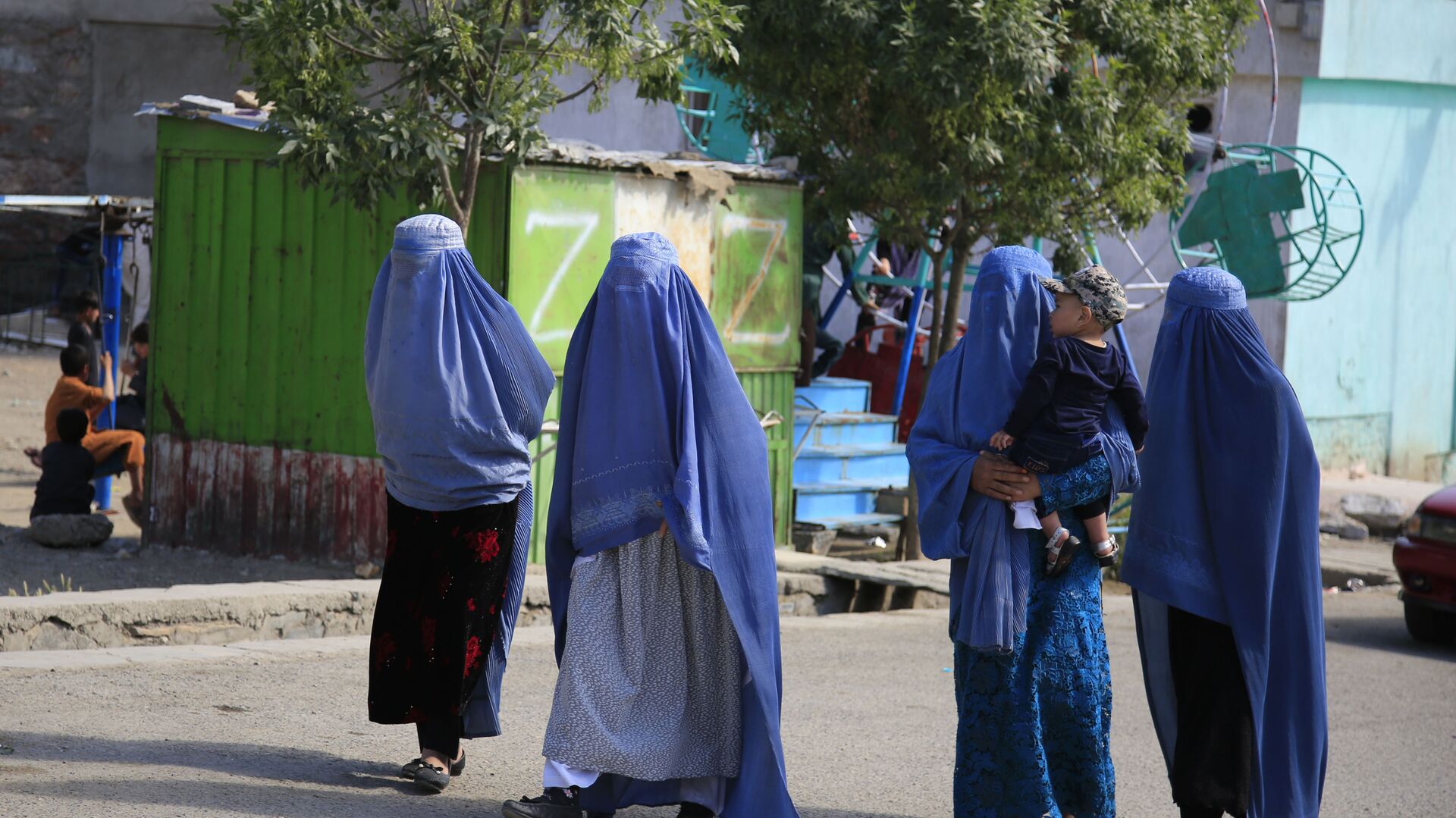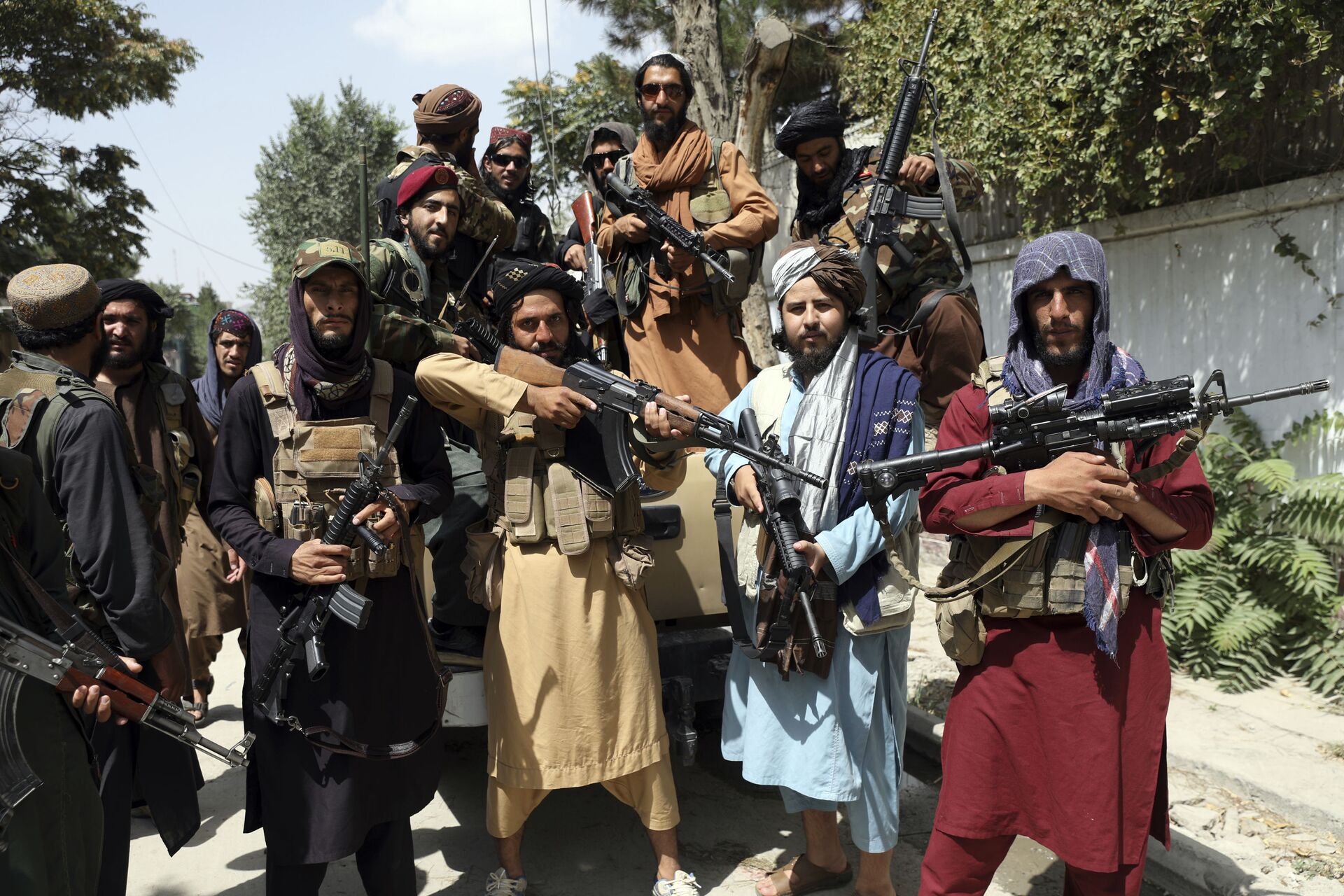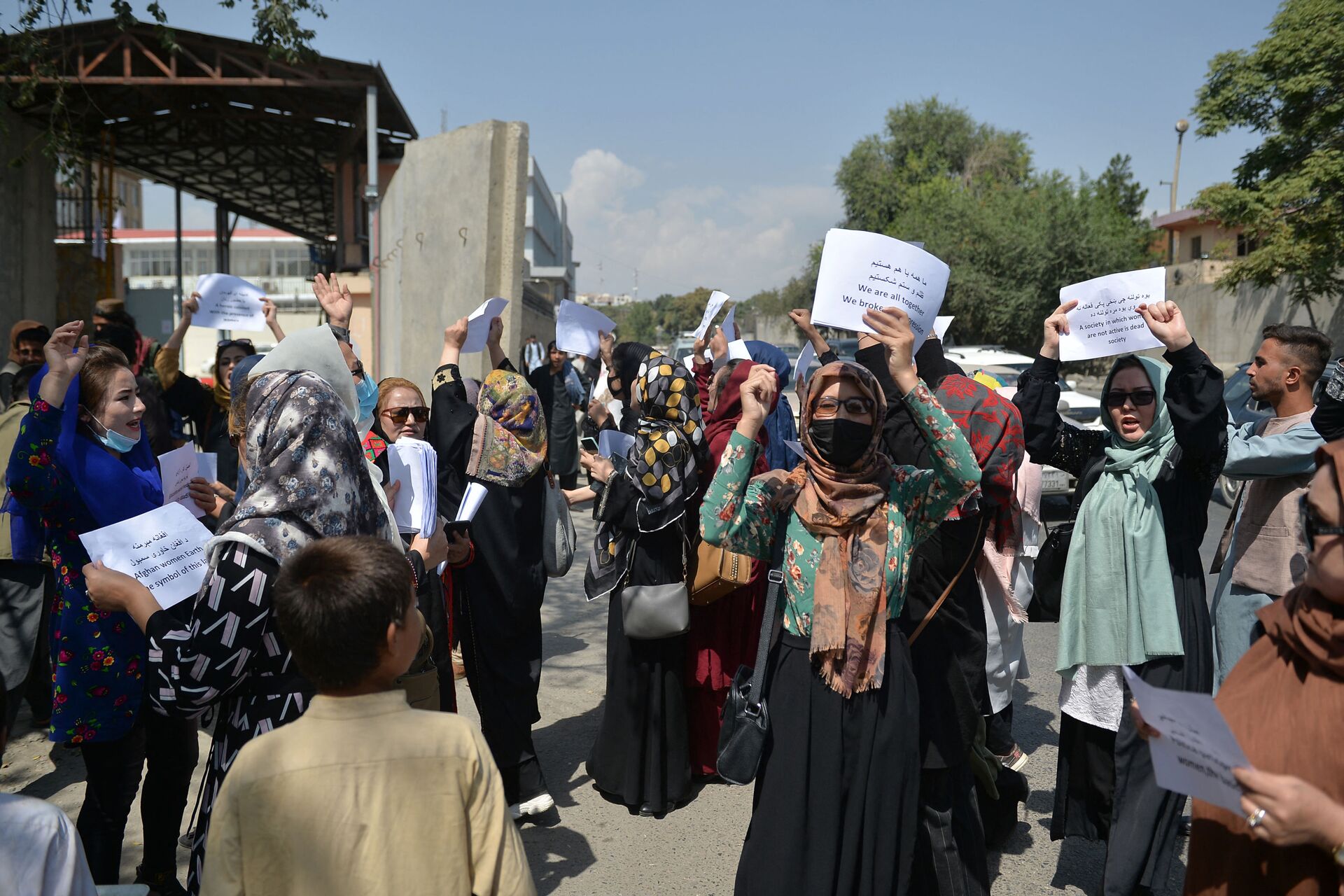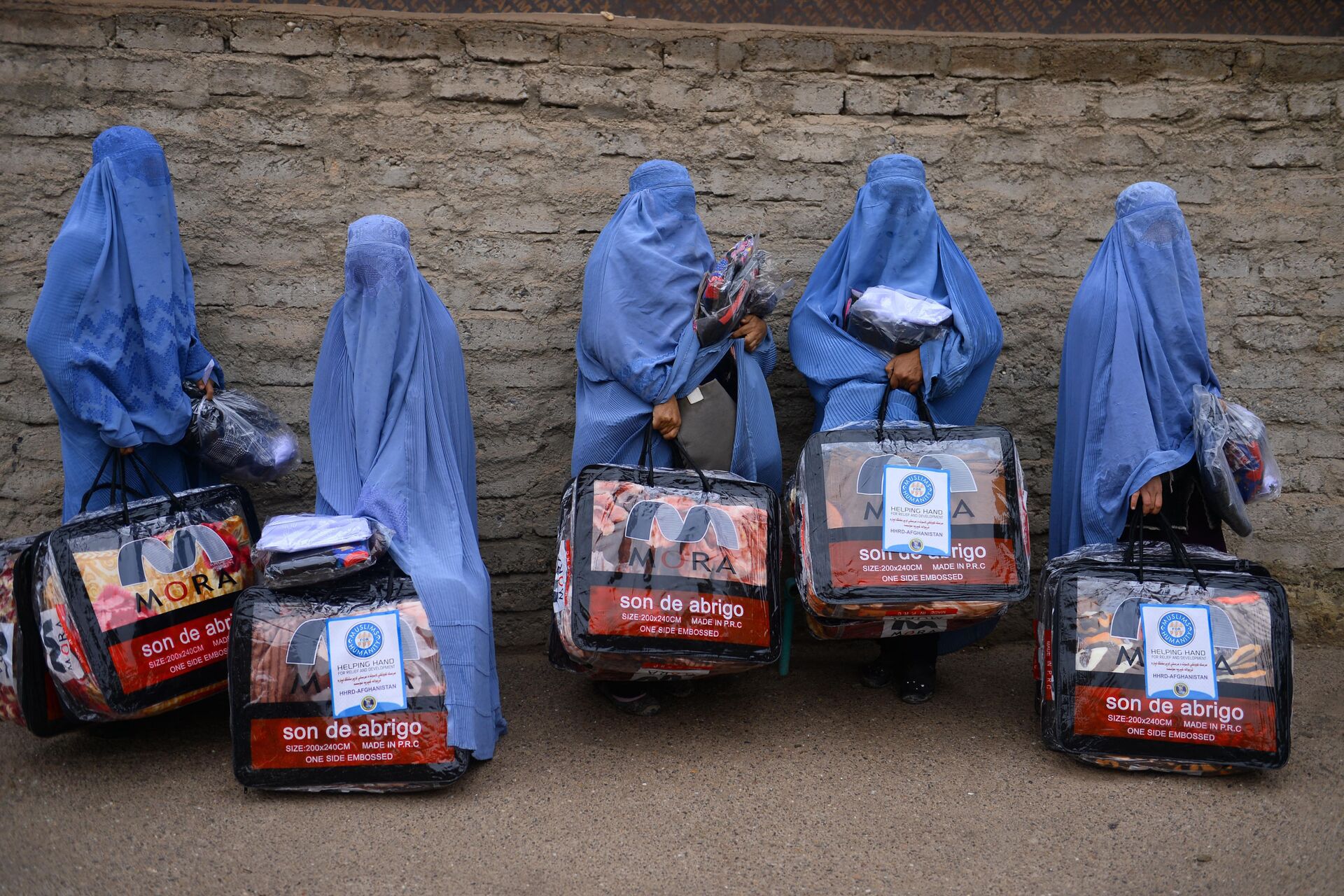https://sputnikglobe.com/20210910/young-female-afghan-reporter-fears-dark-future-under-taliban-rule-1088955736.html
Young Female Afghan Reporter Fears Dark Future Under Taliban Rule
Young Female Afghan Reporter Fears Dark Future Under Taliban Rule
Sputnik International
MOSCOW (Sputnik), Tommy Yang - M. used to go to school despite being a girl in Afghanistan. When she became interested in economics in high school, she started... 10.09.2021, Sputnik International
2021-09-10T14:16+0000
2021-09-10T14:16+0000
2021-09-10T14:16+0000
afghanistan
taliban
afghanistan war
afghanistan
asia
https://cdn1.img.sputnikglobe.com/img/07e5/07/15/1083427480_0:138:3149:1909_1920x0_80_0_0_046b6c1bb68040898288347452a776cd.jpg
As a third-year student in a journalism programme at a university in Kabul, M. was close to making her dreams come true.However, the swift collapse of the previous Afghan government and the surprising takeover of the Taliban* in Afghanistan not only crushed the aspiring reporter's dreams but also brought fears of retribution owing to her previous work as a journalist.The young Afghan student explained the kind of threats she has received due to her previous reporting.Freedom of Press: Taliban StyleAfter the Taliban took over most parts of Afghanistan in August, one of the key concerns among local reporters was whether the new administration would respect freedom of the press.During the first press conference after consolidating their hold on Afghanistan in August, Taliban spokesman Zabihullah Mujahid said private media would continue to be "free and independent" while offering a number of suggestions.What happened to the Afghan reporters who covered the anti-Taliban protests this week could help explain what the Taliban spokesman meant.A number of Afghan reporters were detained by the Taliban and severely beaten in police custody after covering the protests in Kabul this week.Zaki Daryabi, founder and editor-in-chief of the Etilaat Roz newspaper in Afghanistan, shared pictures of two wounded male reporters on social media. Both had large welts on their backs and upper legs from being beaten.M., the female journalism student, shared the same pictures with Sputnik during the interview and expressed fears of what would happen to a female reporter like her.M. argued that the Taliban would continue to target reporters despite their claims of ensuring a "free and independent" press.She explained that the Taliban would not allow any critical coverage from the press.Bleak Future for Afghan WomenIn addition to facing threats because of her journalism, M. also felt hopeless as a woman in Afghanistan under the Taliban’s rule.During the same press conference in August, Taliban spokesman Zabihullah Mujahid said the group would respect women's rights in Afghanistan "within the framework of Islamic law."M. illustrated the kind of changes that have been made after the Taliban took over.Under the previous government, M. said she had no problems going to the same school or attending the same classes as boys in Afghanistan.The young Afghan student was also worried about whether she could continue to work as a woman under the Taliban.This is also why M. hopes to move to the United States or Canada to pursue a brighter future as a woman and continue her study in journalism there.Unfortunately, as she never worked closely with any American or Canadian organisations, M. doesn’t know if she would be eligible for the special immigrant programmes of those countries.Nevertheless, M. said she would continue to apply for immigrant visas to move abroad instead of living in fear in Afghanistan under the Taliban's rule.* The Taliban movement is a terrorist group, banned in Russia and many other countries
afghanistan
Sputnik International
feedback@sputniknews.com
+74956456601
MIA „Rosiya Segodnya“
2021
Sputnik International
feedback@sputniknews.com
+74956456601
MIA „Rosiya Segodnya“
News
en_EN
Sputnik International
feedback@sputniknews.com
+74956456601
MIA „Rosiya Segodnya“
Sputnik International
feedback@sputniknews.com
+74956456601
MIA „Rosiya Segodnya“
afghanistan, taliban, afghanistan war
afghanistan, taliban, afghanistan war
Young Female Afghan Reporter Fears Dark Future Under Taliban Rule
MOSCOW (Sputnik), Tommy Yang - M. used to go to school despite being a girl in Afghanistan. When she became interested in economics in high school, she started to read news about the topic and was fascinated with the idea of becoming a reporter one day.
"When I was in the twelfth grade, I started working as a trainee at a local radio station", 23-year-old M. told Sputnik.
As a third-year student in a journalism programme at a university in Kabul, M. was close to making her dreams come true.
However, the swift collapse of the previous Afghan government and the surprising takeover of the Taliban* in Afghanistan not only crushed the aspiring reporter's dreams but also brought fears of retribution owing to her previous work as a journalist.
"I cannot leave my house because I'm scared. Sometimes, I do not go to the office because my family does not allow it. They say it is better to turn myself in to the Taliban and apologise as I was one of those who published negative and incriminating news about the Taliban," M. said.
The young Afghan student explained the kind of threats she has received due to her previous reporting.
"Once I received a letter which said that I should surrender to the Taliban and apologise for my activities. If I didn't turn myself in to the Taliban, I would be the one to blame for everything that might happen to me or my family", she said.
Freedom of Press: Taliban Style
After the Taliban took over most parts of Afghanistan in August, one of the key concerns among local reporters was whether the new administration would respect freedom of the press.
During the first press conference after consolidating their hold on Afghanistan in August, Taliban spokesman Zabihullah Mujahid said private media would continue to be "free and independent" while offering a number of suggestions.
"We have three suggestions: No broadcast should contradict Islamic values; they should be impartial; no one should broadcast anything that goes against our national interests", he said.
What happened to the Afghan reporters who covered the anti-Taliban protests this week could help explain what the Taliban spokesman meant.
A number of Afghan reporters were detained by the Taliban and severely beaten in police custody after covering the protests in Kabul this week.
Zaki Daryabi, founder and editor-in-chief of the Etilaat Roz newspaper in Afghanistan, shared pictures of two wounded male reporters on social media. Both had large welts on their backs and upper legs from being beaten.
M., the female journalism student, shared the same pictures with Sputnik during the interview and expressed fears of what would happen to a female reporter like her.
"These are male journalists who have been beaten by the Taliban, so think about what they will do to the women", she said.
M. argued that the Taliban would continue to target reporters despite their claims of ensuring a "free and independent" press.
"I used to work as a journalist, but now I cannot work anymore and have to stay home, because despite the Taliban saying they show mercy for people, that is not true. I saw the Taliban militants come to houses of journalists, who reported on security issues, and kill them", she said.
She explained that the Taliban would not allow any critical coverage from the press.
"No journalist can raise the issue of civil rights, or speak on behalf of the whole nation on TV, as the broadcasters are controlled by the Taliban, and nothing targeting them can appear on-air", she said.
Bleak Future for Afghan Women
In addition to facing threats because of her journalism, M. also felt hopeless as a woman in Afghanistan under the Taliban’s rule.
"Before the Taliban takeover women used to have about 70% of all the rights, and now they have no rights", she said.
During the same press conference in August, Taliban spokesman Zabihullah Mujahid said the group would
respect women's rights in Afghanistan "within the framework of Islamic law."
M. illustrated the kind of changes that have been made after the Taliban took over.
"Now, I want to move to the US or Canada, but nobody can get me out of this terrible place. If I stay in Afghanistan, my voice will never be heard," she said."Before the Taliban took over, girls went to university as they wished. But now, we have thousands of fears. The Taliban separated men and women classrooms. Before we had the energy [to study], but the Taliban took the energy from all of us", she said.
Under the previous government, M. said she had no problems going to the same school or attending the same classes as boys in Afghanistan.
The young Afghan student was also worried about whether she could continue to work as a woman under the Taliban.
"The Ministry for Women's Affairs made an announcement that women could no longer work", she said.
This is also why M. hopes to move to the United States or Canada to pursue a brighter future as a woman and continue her study in journalism there.
"Now, I want to move to the US or Canada, but nobody can get me out of this terrible place. If I stay in Afghanistan, my voice will never be heard", she said.
Unfortunately, as she never worked closely with any American or Canadian organisations, M. doesn’t know if she would be eligible for the special immigrant programmes of those countries.
Nevertheless, M. said she would continue to apply for immigrant visas to move abroad instead of living in fear in Afghanistan under the Taliban's rule.
* The Taliban movement is a terrorist group, banned in Russia and many other countries







